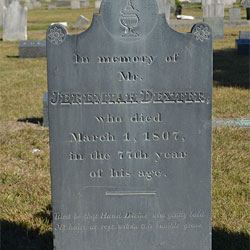Jeremiah Dexter (c.1731-1807)
 Jeremiah Dexter was born around 1731 to Stephen Dexter and Anna Whipple Dexter.
The family home was that of Stephen’s father, John, located just north of
the Burial Ground and east of Pawtucket Avenue. Jeremiah’s great grandfather was Reverend Gregory Dexter, one of the first settlers of Providence, a
printer, and a civic and religious leader, who owned upwards of 1000 acres of land in this area.
Jeremiah Dexter was born around 1731 to Stephen Dexter and Anna Whipple Dexter.
The family home was that of Stephen’s father, John, located just north of
the Burial Ground and east of Pawtucket Avenue. Jeremiah’s great grandfather was Reverend Gregory Dexter, one of the first settlers of Providence, a
printer, and a civic and religious leader, who owned upwards of 1000 acres of land in this area.
By the time of the American Revolution, Gregory Dexter’s land had been divided amongst his great grandchildren. Jeremiah and his brothers Joseph and Edward owned the land to the northeast of what is now the intersection of North Main Street and Rochambeau Avenue where the French Army encamped in 1782 after the return march from Yorktown. Jeremiah’s house, built in 1754, still stands at that corner, now used for the offices of Preserve RI. It is the only extant building from the Dexter family’s 18th century holdings and one of few colonial farmhouses remaining in Providence.
Jeremiah Dexter was a farmer and also was known as a “natural bone setter.” The following tale is recounted in the 1884 book Our French Allies :
“At the time of the French encampment he brought one day into his house a bag of silver, which he had received from the French for the use of the land, and probably for farm produce sold to them. Putting it on the floor, he told his two nieces that he would give it to either of them that could lift it, but neither was able to do so.”
When the French Army left camp, Dexter received as payment for 699 cords of wood “cut off of 23 acres, 1 rod, and 14 poles of land,” and various damages, $1446 in depreciated and practically worthless continental paper.
Dexter married late in life to Prudence Kimball, who bore nine children. He died March 1, 1807, survived by his wife Prudence, five daughters, and three sons. His property, which included a significant amount of land east of North Main Street and north of Rochambeau Avenue, was divided equally between his three sons. At that time, the land was part of North Providence (since 1765), but was re-annexed by Providence in 1874 (at which time North Street was renamed Rochambeau Avenue).
